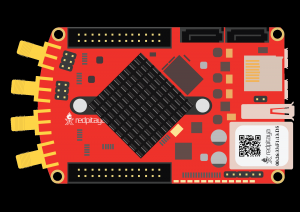2.3.6.8.8. CAN (HW api)
2.3.6.8.8.1. Description
This example demonstrates communication using the Red Pitaya CAN interface. The code below simulates a loopback by sending a message from the CAN socket.
2.3.6.8.8.3. Code - C
Note
Although the C code examples don’t require the use of the SCPI server, we have included them here to demonstrate how the same functionality can be achieved with different programming languages. Instructions on how to compile the code are here.
/* @brief This is a simple application for testing CAN communication on a RedPitaya
*
* (c) Red Pitaya http://www.redpitaya.com
*
* This part of code is written in C programming language.
* Please visit http://en.wikipedia.org/wiki/C_(programming_language)
* for more details on the language used herein.
*/
#include <stdio.h>
#include <stdlib.h>
#include <string.h>
#include "rp_hw_can.h"
int main(int argc, char *argv[]){
int res = rp_CanSetFPGAEnable(true); // init can in fpga for pass can controller to GPIO (N7,P7)
printf("Init result: %d\n",res);
res = rp_CanStop(RP_CAN_0); // set can0 interface to DOWN for configure
printf("Stop can0: %d\n",res);
res = rp_CanSetBitrate(RP_CAN_0,200000); // set can0 bitrate
printf("Set bitrate: %d\n",res);
res = rp_CanSetControllerMode(RP_CAN_0,RP_CAN_MODE_LOOPBACK,true); // set loopback mode
printf("Set loopback mode ON: %d\n",res);
res = rp_CanStart(RP_CAN_0); // set can0 interface to UP
printf("Start can0: %d\n",res);
res = rp_CanOpen(RP_CAN_0); // open socket for can0
printf("Open socket: %d\n",res);
unsigned char tx_buffer[8];
tx_buffer[0] = 1;
tx_buffer[1] = 2;
tx_buffer[2] = 3;
res = rp_CanSend(RP_CAN_0,123, tx_buffer,3,false,false,0); // write buffer to can0
printf("Write result: %d\n",res);
rp_can_frame_t frame;
res = rp_CanRead(RP_CAN_0,2000, &frame); // read frame from can0
printf("Read result: %d\n",res);
printf("Can ID: %d data: %d,%d,%d\n",frame.can_id,frame.data[0],frame.data[1],frame.data[2]);
res = rp_CanClose(RP_CAN_0); // close socket for can0
printf("Close can0 result: %d\n",res);
return 0;
}
2.3.6.8.8.4. Code - MATLAB®
%% Define Red Pitaya as TCP/IP object
IP= ''; % Input IP of your Red Pitaya...
port = 5000;
tcpipObj=tcpip(IP, port);
%% Open connection with your Red Pitaya
fopen(tcpipObj);
tcpipObj.Terminator = 'CR/LF';
fprintf(tcpipObj,'CAN:FPGA ON');
fprintf(tcpipObj,'CAN0:STOP'); % stop can interface for configure
fprintf(tcpipObj,'CAN0:BITRate 200000'); % set bitrate for can0
res = query(tcpipObj,'CAN0:BITRate:SP?');
fprintf('Bitrate %s\n', res);
fprintf(tcpipObj,'CAN0:MODE LOOPBACK,ON'); % set loopback mode
fprintf(tcpipObj,'CAN0:START'); % start can0 interface
fprintf(tcpipObj,'CAN0:OPEN'); % open can0 socket
fprintf(tcpipObj,'CAN0:Send123 1,2,3'); % write to can0 3 bytes
fprintf('CAN0:Send123 1,2,3\n');
res = query(tcpipObj,'CAN0:Read:Timeout2000?'); % read frame from can0
fprintf('Read: %s', res);
fprintf(tcpipObj,'CAN0:CLOSE'); % close can0
%% Close connection with Red Pitaya
fclose(tcpipObj);
2.3.6.8.8.5. Code - Python
Using just SCPI commands:
#!/usr/bin/python3
import sys
import time
import redpitaya_scpi as scpi
rp_s = scpi.scpi(sys.argv[1])
rp_s.tx_txt('CAN:FPGA ON')
print("CAN:FPGA ON")
rp_s.check_error()
rp_s.tx_txt('CAN0:STOP')
print("CAN0:START")
rp_s.check_error()
rp_s.tx_txt('CAN0:BITRate 200000')
print("CAN0:BitRate 200000")
rp_s.check_error()
rp_s.tx_txt('CAN0:MODE LOOPBACK,ON')
print("CAN0:MODE LOOPBACK,ON")
rp_s.check_error()
rp_s.tx_txt('CAN0:START')
print("CAN0:START")
rp_s.check_error()
rp_s.tx_txt('CAN0:OPEN')
print("CAN0:OPEN")
rp_s.check_error()
rp_s.tx_txt('CAN0:Send123 1,2,3')
print("CAN0:SEND123 1,2,3")
rp_s.check_error()
rp_s.tx_txt('CAN0:Read:Timeout2000?')
print("CAN0:Read:Timeout2000?",rp_s.rx_txt_check_error())
rp_s.tx_txt('CAN0:CLOSE')
print("CAN0:CLOSE")
rp_s.check_error()
